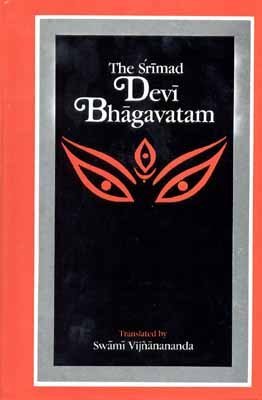The Devi Bhagavata Purana
by Swami Vijñanananda | 1921 | 545,801 words | ISBN-10: 8121505917 | ISBN-13: 9788121505918
The English translation of the Devi Bhagavata Purana. This Sanskrit work describes the Devi (Divine), the Goddess, as the foundation of the world and as identical with Brahman, the Supreme Being. The Devi Bhagavata Purana is one of the most important works in Shaktism, a branch of Hinduism focusing on the veneration of the divine feminine, along w...
Chapter 10 - On the anecdote of the King Suratha
1-4. Nārāyaṇa said :-- Now the Seventh Manu is the Right Hon’ble His Excellency the Lord Vaivasvata Manu Śrāddha Deva, honoured by all the kings, and the Enjoyer of the Highest Bliss, Brahmānanḍa. I will now speak of this seventh Manu. He, too, practised austerities before the Highest Devī and by Her Grace, got the sovereignty of the earth for one Manvantara.
The Eighth Manu is the Sun’s son, known as Sāvarṇi. This personage, a devotee of the Devī, honoured by the kings, gentle, patient and powerful king Sāvarṇi worshipped the Devī in his previous births and, by Her boon, became the Lord of the Manvantara.
5. Nārada said :-- O Bhagavān! How did this Sāvarṇi Manu worship in his previous birth the earthen image of the Devī. Kindly describe this to me.
6-13. Nārāyaṇa said :-- O Nārada! This Eighth Manu had been, before, in the time of Svārociṣa Manu (the second Manu), a famous king, known by the name of Suratha, born of the family of Caitra, and very powerful. He could well appreciate merits, clever in the science of archery, amassed abundance of wealth, a generous donor, a very liberal man and he was a celebrated poet and honoured by all. He was skilled in all arts of warfare with weapons and indomitable in crushing his foes. Once on a time, some of his powerful enemies destroyed the city of Kolā, belonging to the revered king and succeeded in besieging his capital wherein he remained. Then the king Suratha, the conqueror of all his foes went out to fight with the enemies but he was defeated by them. Taking advantage of this opportunity, the king’s ministers robbed him of all his wealth. The illustrious king then went out of the city and with a sorrowful heart rode alone on his horse on the plea of having a game and walked to and fro, as if, absent-minded.
14-25. The king, then, went to the hermitage of the Muni Sumedhā, who could see far-reaching things (a Man of the Fourth Dimension). It was a nice, quiet Āśrama, surrounded by quiet and peaceful animals and filled with disciples. There in that very sacred Āśrama, his heart became relieved and he went on living there.
One day, when the Muni finished his worship, etc.
, the king went to him and saluted him duly and humbly asked him the following :-- “O Muni! I am suffering terribly from my mental pain. O Deva on the earth! Why I am suffering so much though I know everything, as if I am quite an ignorant man. After my defeat from my enemies, why does my mind become now compassionate towards those who stole away my kingdom. O Best of the knowers of the Vedas! What am I to do now? Where to go? How can I make me happy? Please speak on these. O Muni! Now I am in want of your good grace.”
The Muni said :-- “O Lord of the earth! Hear the extremely wonderful glories of the Devī that have no equal and that can fructify all desires. She, the Mahā Māyā, Who is all this world, is the Mother of Brahmā, Viṣṇu and Maheśa. O King! Know verily that it is She and She alone, that can forcibly attract the hearts of all the Jīvas and throw them in dire utter delusion. She is always the Creatrix, Preservrix and Destructrix of the Universe in the form of Hara. This Mahā Māyā fulfills the desires of all the Jīvas and She is known as the insurmountable Kālarātri. She is Kālī, the Destructrix of all this universe and She is Kamalā residing in the lotus. Know that this whole world rests on Her and it will become dissolved in Her. She is therefore, the Highest and Best. O King! Know, verily, that he alone can cross the delusion (Moha) on whom the Grace of the Devī falls and otherwise no one can escape from this Anādi Moha.”
Here ends the Tenth Chapter of the Tenth Book on the anecdote of the King Suratha in the Mahā Purāṇam Śrī Mad Devī Bhāgavatam of 18,000 verses by Mahārṣi Veda Vyāsa.
